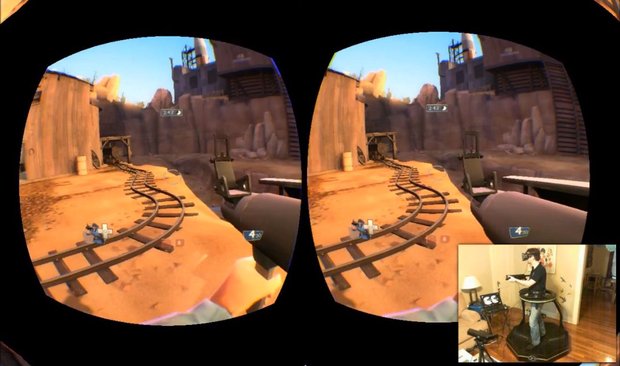Could Sony's VR headset cripple virtual reality's potential?
It's fun to think about virtual reality's best-case scenario: a theoretical future in which we all run around in living rooms that have treadmill floors, immersed in whatever types of gaming experiences only VR can offer. But that's a long ways off. The Oculus Rift still isn't available to consumers, and even when it launches, it'll be a PC-only peripheral, leaving the massive console crowd out of the picture entirely. Even the PS4 and Xbox One, according to Oculus VR CEO Palmer Luckey, are "too limited" to support the device. Sony, however, thinks the PS4 is a perfect machine for virtual reality. According to our pals at TechRadar, Sony is set to unveil its very own virtual reality headset for the PS4 during this year's Game Developers Conference in March. And while this could be exciting news for VR's future, it also has the potential to cripple its long-term growth.
First, let's start with why Luckey believes VR--or the Oculus Rift, specifically--isn't well-suited for console gaming. As he told TechRadar, creating convincing, immersive VR programs requires that the hardware in question be able to render high resolutions at more than 60 frames per second in 3D. That automatically cuts last-gen consoles from the list of platform options. It also puts a damper on the Xbox One, where developers have struggled to deliver 1080p performances. In this regard, the PS4 seems to be the only possible option in the current console space. BUT! Luckey expects that the jump in VR tech over the next five years is going to be massive, and he argues that quality VR--that is, virtual reality which provides the type of experiences we all think about when we imagine what games will look like 60 years from now--can only exist on platforms that aren't closed. Thus: PC is its future.

So what does this have to do with Sony's alleged upcoming announcement? I'd argue that a PS4 VR headset could have a surprisingly large impact on virtual reality's future. I think that initially, it'll be a good thing. I love PC gaming, but it's a scientific fact proven by scientists that there are far more console gamers than there are people willing to shell out $800 to build a mid-ranged gaming machine. The PS4 is selling like crazy, and if this continues, Sony will likely have a rather large install base to tap into once its VR headset is available--not to mention a bank vault capable of financing the operation. Assuming Sony takes its time developing a set that is lightweight, comfortable, and capable of supporting experiences at least on par with those in development for the Oculus Rift, I suspect the next few years for VR will be very exciting indeed. Just thinking about playing the next [insert AAA shooter here] in virtual reality has me all shades of pumped. Of course, if this hypothetical headset flops, Sony also risks prematurely damaging the public's perception of what VR can accomplish. The last thing virtual reality needs is to be written off as a gimmick yet again.
But let's look past the short term. As time goes on, VR experiences will outscale the processing power of the PS4's hardware. I know, I know, that sounds silly at this exact point in time--these are brand-new consoles we're talking about. But remember: Luckey's not even bothering with consoles because their potential is hard-capped. We've written before about how next-gen consoles are being held back by their last-gen counterparts, but PC enthusiasts are quick to point out that games in general are held back by closed platforms with locked-in specs--aka gaming consoles.

So, if Sony's VR headset is accepted with open arms by the gaming community, and it sells enough units to kick VR game development off in full swing, then virtual reality will have officially arrived. But what does that mean for VR's future seven years from now, when its possibilities are bottlenecked by hardware that can't evolve to support them? To keep VR delegated only to the PC space is admittedly a selfish notion--it's entirely possible that the Oculus Rift alone isn't enough to get things going. But I can't help but think that, ultimately, my PC is where I'll be headed when it comes time to explore a game world from a true first-person perspective.
Sign up to the GamesRadar+ Newsletter
Weekly digests, tales from the communities you love, and more
Ryan was once the Executive Editor of GamesRadar, before moving into the world of games development. He worked as a Brand Manager at EA, and then at Bethesda Softworks, before moving to 2K. He briefly went back to EA and is now the Director of Global Marketing Strategy at 2K.



